Unit1 Happy Holiday单元复习课件—人教版八年级上册
文档属性
| 名称 | Unit1 Happy Holiday单元复习课件—人教版八年级上册 | 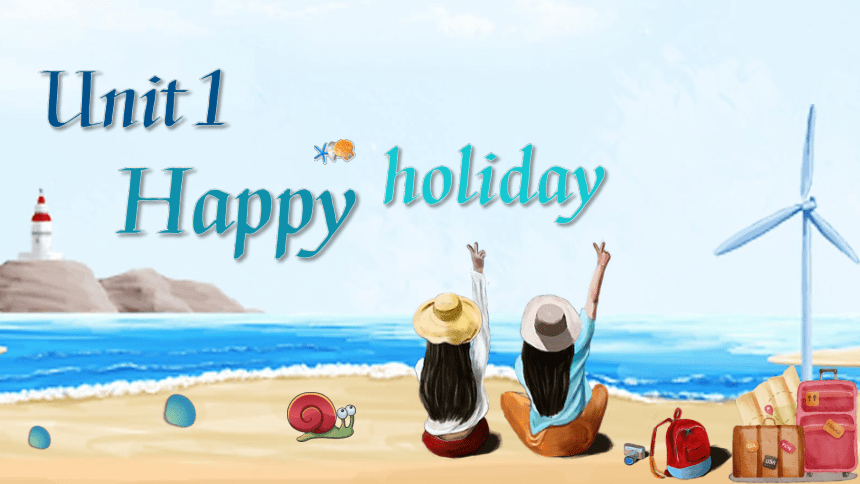 | |
| 格式 | pptx | ||
| 文件大小 | 8.1MB | ||
| 资源类型 | 试卷 | ||
| 版本资源 | 人教版 | ||
| 科目 | 英语 | ||
| 更新时间 | 2025-07-05 09:27:15 | ||
图片预览

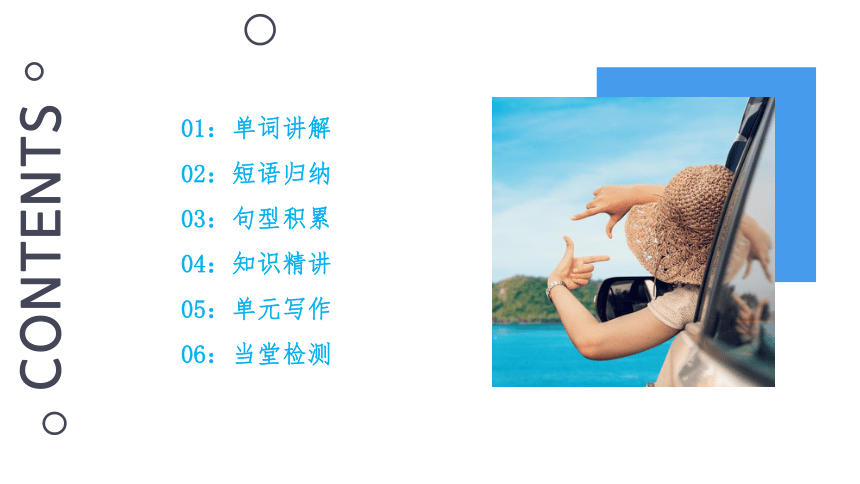
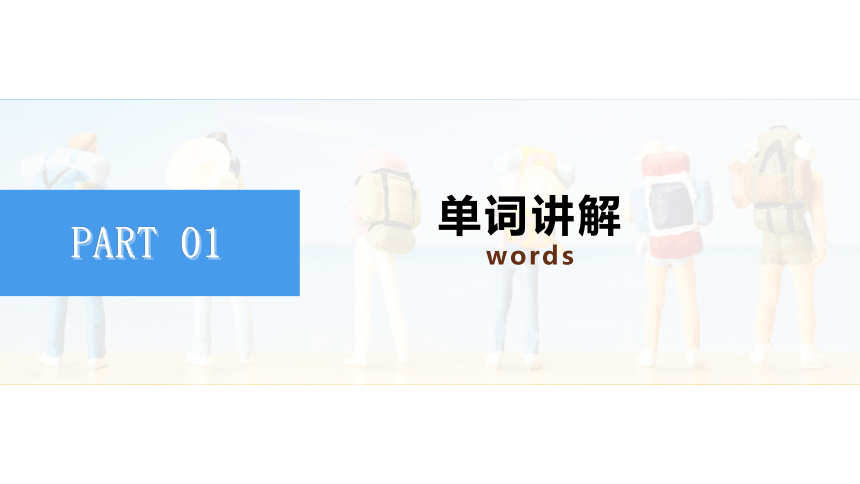
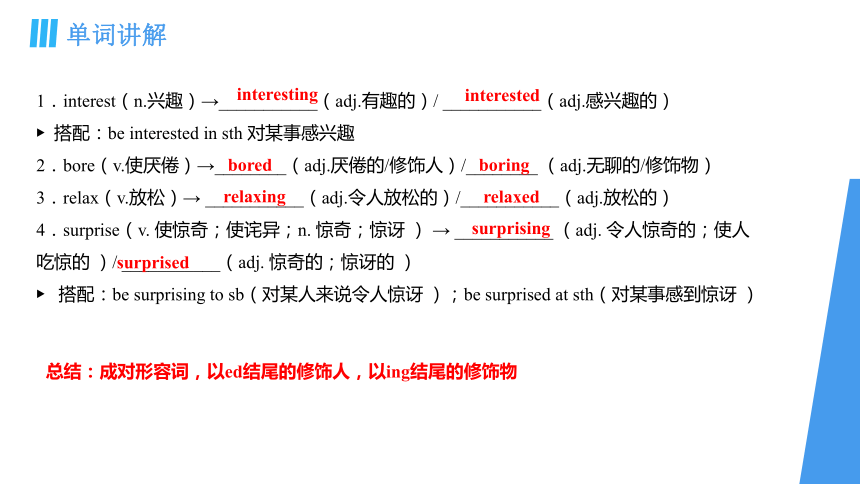
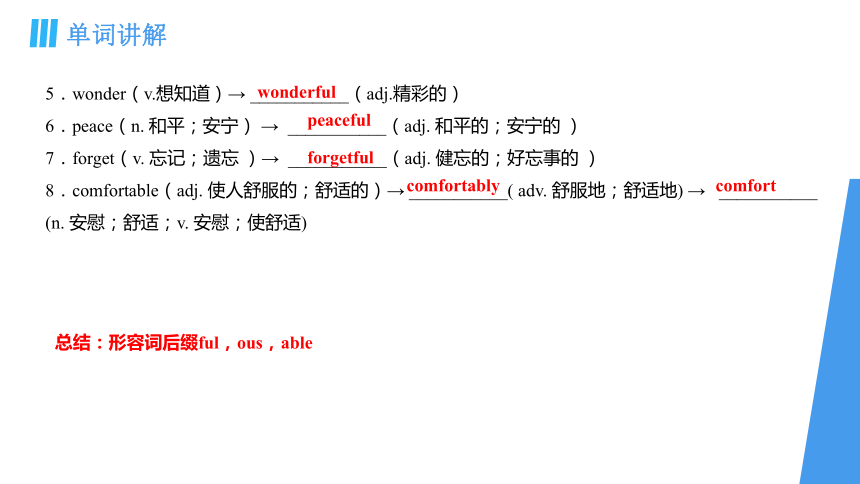
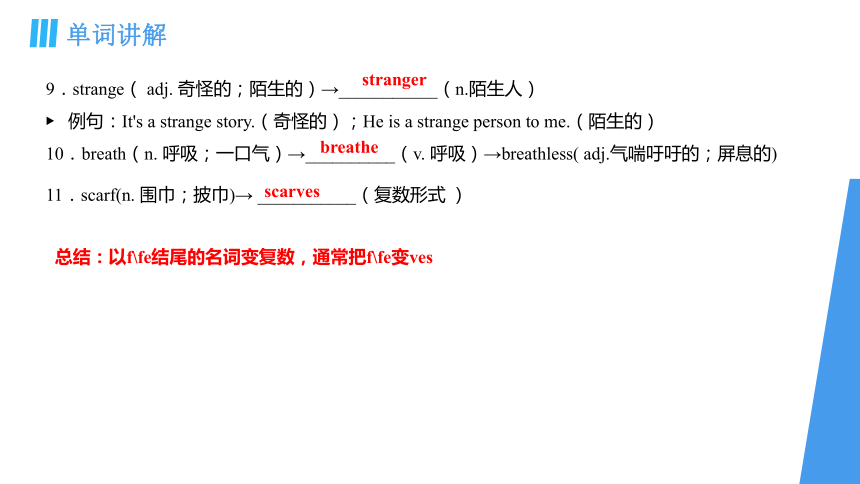
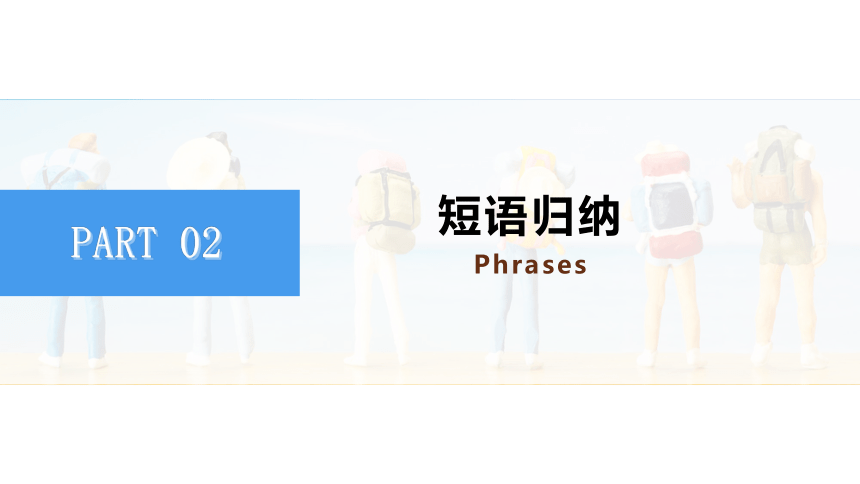
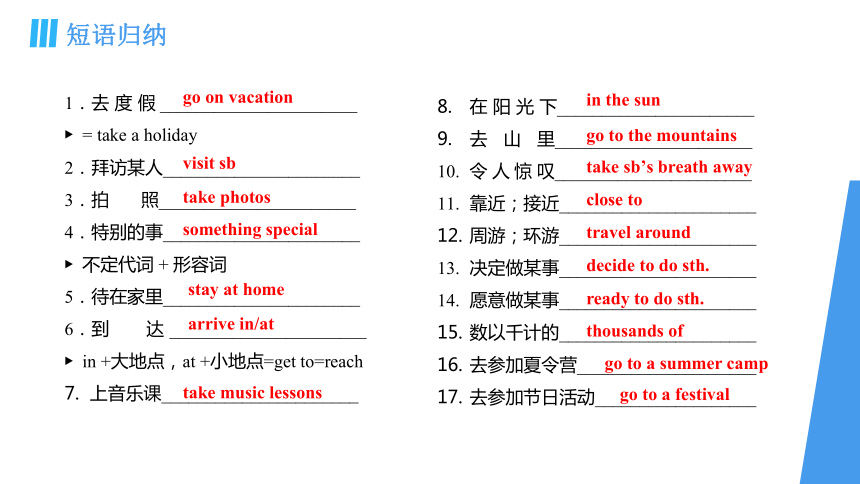
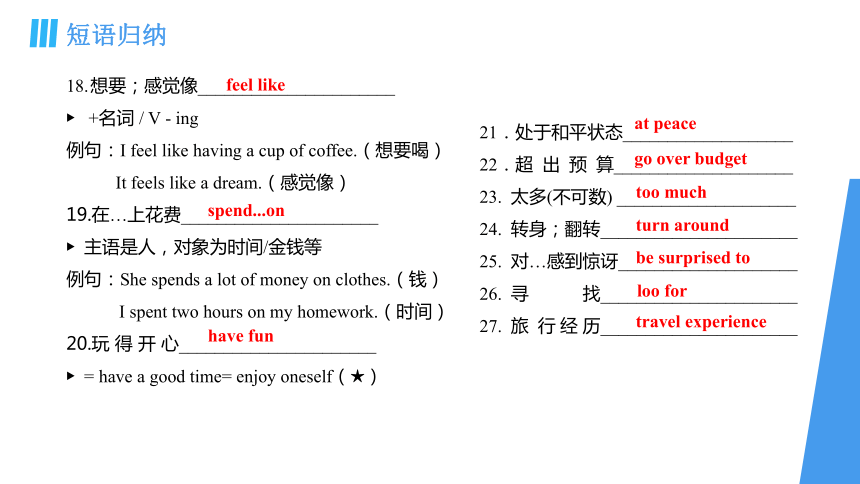
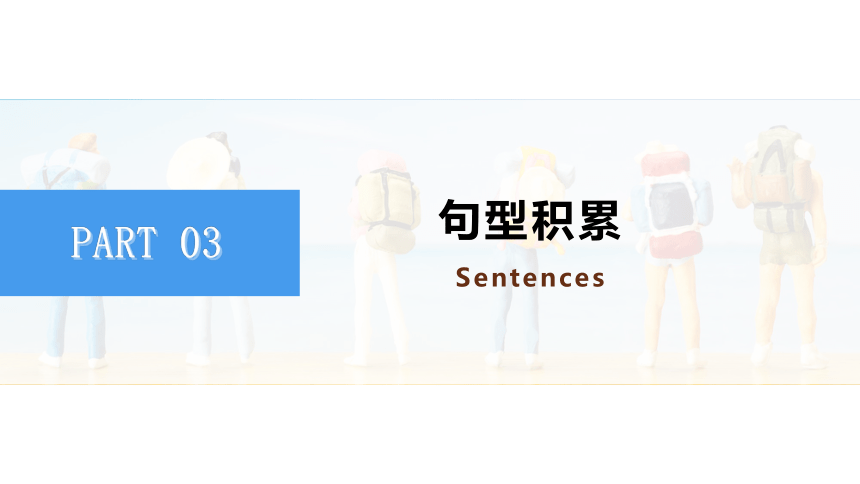
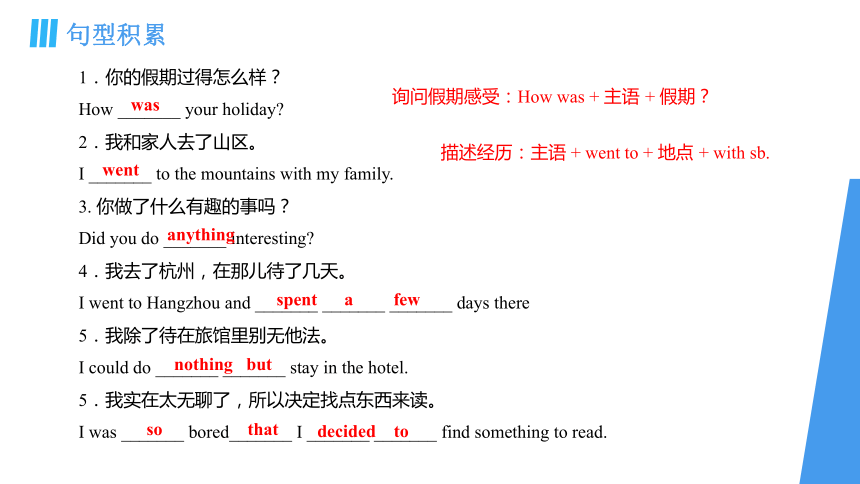
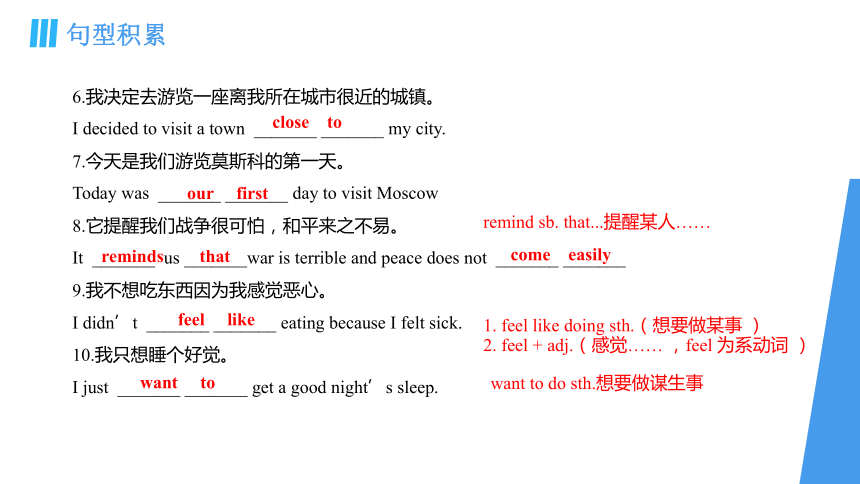
文档简介
(共40张PPT)
Unit1
Happy
holiday
01:单词讲解
02:短语归纳
03:句型积累
04:知识精讲
05:单元写作
06:当堂检测
CONTENTS
单词讲解
words
PART 01
单词讲解
1.interest(n.兴趣)→___________(adj.有趣的)/ ___________(adj.感兴趣的)
搭配:be interested in sth 对某事感兴趣
2.bore(v.使厌倦)→________(adj.厌倦的/修饰人)/________ (adj.无聊的/修饰物)
3.relax(v.放松)→ ___________(adj.令人放松的)/___________(adj.放松的)
4.surprise(v. 使惊奇;使诧异;n. 惊奇;惊讶 ) → ___________ (adj. 令人惊奇的;使人吃惊的 )/ ___________(adj. 惊奇的;惊讶的 )
搭配:be surprising to sb(对某人来说令人惊讶 );be surprised at sth(对某事感到惊讶 )
interesting
interested
bored
boring
总结:成对形容词,以ed结尾的修饰人,以ing结尾的修饰物
surprising
surprised
relaxed
relaxing
单词讲解
5.wonder(v.想知道)→ ___________(adj.精彩的)
6.peace(n. 和平;安宁) → ___________(adj. 和平的;安宁的 )
7.forget(v. 忘记;遗忘 )→ ___________(adj. 健忘的;好忘事的 )
8.comfortable(adj. 使人舒服的;舒适的)→ ___________( adv. 舒服地;舒适地) → ___________ (n. 安慰;舒适;v. 安慰;使舒适)
wonderful
peaceful
forgetful
总结:形容词后缀ful,ous,able
comfortably
comfort
单词讲解
9.strange( adj. 奇怪的;陌生的)→___________(n.陌生人)
例句:It's a strange story.(奇怪的);He is a strange person to me.(陌生的)
10.breath(n. 呼吸;一口气)→__________(v. 呼吸)→breathless( adj.气喘吁吁的;屏息的)
11.scarf(n. 围巾;披巾)→ ___________(复数形式 )
stranger
breathe
scarves
总结:以f\fe结尾的名词变复数,通常把f\fe变ves
短语归纳
Phrases
PART 02
短语归纳
1.去 度 假 ______________________
= take a holiday
2.拜访某人______________________
3.拍 照______________________
4.特别的事______________________
不定代词 + 形容词
5.待在家里______________________
6.到 达 ______________________
in +大地点,at +小地点=get to=reach
7. 上音乐课______________________
something special
go on vacation
visit sb
arrive in/at
take photos
stay at home
take music lessons
在 阳 光 下______________________
去 山 里______________________
令 人 惊 叹______________________
靠近;接近______________________
周游;环游______________________
决定做某事______________________
愿意做某事______________________
数以千计的______________________
去参加夏令营____________________
去参加节日活动__________________
go to the mountains
take sb’s breath away
close to
travel around
decide to do sth.
ready to do sth.
thousands of
go to a summer camp
go to a festival
in the sun
短语归纳
想要;感觉像______________________
+名词 / V - ing
例句:I feel like having a cup of coffee.(想要喝)
It feels like a dream.(感觉像)
19.在…上花费______________________
主语是人,对象为时间/金钱等
例句:She spends a lot of money on clothes.(钱)
I spent two hours on my homework.(时间)
20.玩 得 开 心______________________
= have a good time= enjoy oneself(★)
feel like
spend...on
have fun
21.处于和平状态___________________
22.超 出 预 算____________________
23. 太多(不可数) ____________________
24. 转身;翻转______________________
25. 对…感到惊讶____________________
26. 寻 找______________________
27. 旅 行 经 历______________________
turn around
be surprised to
loo for
travel experience
too much
go over budget
at peace
句型积累
Sentences
PART 03
句型积累
1.你的假期过得怎么样?
How _______ your holiday
2.我和家人去了山区。
I _______ to the mountains with my family.
3. 你做了什么有趣的事吗?
Did you do _______ interesting
4.我去了杭州,在那儿待了几天。
I went to Hangzhou and _______ _______ _______ days there
5.我除了待在旅馆里别无他法。
I could do _______ _______ stay in the hotel.
5.我实在太无聊了,所以决定找点东西来读。
I was _______ bored_______ I _______ _______ find something to read.
was
went
anything
spent a few
nothing but
so that
decided to
询问假期感受:How was + 主语 + 假期?
描述经历:主语 + went to + 地点 + with sb.
句型积累
6.我决定去游览一座离我所在城市很近的城镇。
I decided to visit a town _______ _______ my city.
7.今天是我们游览莫斯科的第一天。
Today was _______ _______ day to visit Moscow
8.它提醒我们战争很可怕,和平来之不易。
It _______ us _______war is terrible and peace does not _______ _______
9.我不想吃东西因为我感觉恶心。
I didn’t _______ _______ eating because I felt sick.
10.我只想睡个好觉。
I just _______ _______ get a good night’s sleep.
close to
our first
reminds that
come easily
feel like
want to
remind sb. that...提醒某人……
1. feel like doing sth.(想要做某事 )
2. feel + adj.(感觉…… ,feel 为系动词 )
want to do sth.想要做谋生事
句型积累
11.我们全家乘火车去苏格兰度假了
My family _______ a train to Scotland _______ a holiday.
12.山间景色太美了,令我惊叹不已。
The mountain scenery was _______ beautiful _______ it took my breath away.
13.然而,假期最重要的意义在于让身心得到休息。
However, the _______ important part of a holiday is _______ _______ your mind and body.
14.我经历了一次多么美妙的体验啊!
What _______ _______ experience I had!
a wonderful
most
to rest
so that
took for
感叹句:What + a/an +形容词+名词+主语+谓语!
so +形容词/副词+that+句子:如此...以致于...
language points
PART 04
知识精讲
知识精讲
知识点1:vacation 假期
搭配:
go on vacation 去度假(强调动作)
be on vacation 在度假(强调状态)
summer/winter vacation 暑 / 寒假
例句:
I’m going on vacation to Japan next week.(动作)
They are on vacation in Hawaii now.(状态)
知识精讲
知识点2:few /a few /little/a little 辨析★
词条 意义 用法 例句
few 几乎没有 表否定,修饰可数名词复数 Few students like math exams.
a few 几个;一些 表肯定,修饰可数名词复数 There are a few apples in the fridge.
little 几乎没有 表否定,修饰不可数名词 Little water is left in the bottle.
a little 一点;一些 表肯定,修饰不可数名词 Could you give me a little milk
【活学活用】
①___________students can anwser the question because it is too hard.
②He has__________money left in his wallet, so he can buy nothing.
A a few B a little C few D little
C
D
知识精讲
知识点3:感官动词
用法:taste/smell/look等后接形容词作表语
例:The cake tastes delicious.( )The cake tastes deliciously.( )
主动表被动:例:The flowers smell sweet.(花闻起来香。)
知识点4:辨析so...that...和so that★
①so+形容词/副词+that+句子,如此…以至于…
例:Iwas so tired that I want to stop.我如此累以至于我想停下来。
②句子+so that+句子,表目的,为了,以便于
例:The teacher speak loudly that we can hear clearly.老师大声讲话以便于我们能听清楚。
知识精讲
知识点5:双宾语结构(buy/make/give 等)
结构:
动词 + 间接宾语(人)+ 直接宾语(物);例:He gave me a book.
动词 + 直接宾语 + for/to + 间接宾语;例:He gave a book to me.
常见动词:
加 for:buy, make, cook, draw;加 to:give, send, pass, lend
知识点 6:thousand用法
①数字 + thousand + 可数名词复数,此时 thousand 用单数形式,且不与 of 连用。
例句:There are three thousand books in the library.(图书馆有三千本书。)
②thousands of + 可数名词复数,表示“成千上万的;数以千计的”。
例句:Thousands of people attended the festival.(成千上万的人参加了节日活动。)
相同用法单词:hundred(百)、million(百万)、billion(十亿)
知识精讲
知识点 7:seem 的用法
①主语+seem + (to be) +形容词/名词;例:He seems (to be) a nice person.(★)
②It seems that + 从句;例:It seems that he is right.
③主语+seem to do sth;例:They seem to know each other.
例:He seems (to be) a clever boy. =It seems that he is a clever boy.他似乎是一个聪明的男孩.
例:He seemed to know everything.=It seemed that he knew everything.他似乎什么都知道.
④seem like + 名词;例:It seems like a good idea.(这似乎是个好主意。)
知识精讲
意为"给…的感觉;感觉像",后常接从句。
例句:
He felt like he was swimming. 他感觉像在游泳一样。
知识点 8:feel like 的用法
feel like表示"想要…",其后接名词、代词或动名词。
例句:
I feel like a cup of tea. 我想要一杯茶。
feel like doing sth = want to do sth = would like to do sth
例句:I feel like going to bed.=I want/would like to go to bed.我想上床睡觉。
知识精讲
知识点9:辨析too many vs. too much vs. much too
词条 修饰对象 例句
too much 意为“太多”,后跟不可数名词 I had too much bread.
too many 意为“太多”,后跟可数名词复数 You ask too many questions.
much too 意为“太...”,后跟形容词或副词 It’s much too cold outside.
知识点10:make常用句型
①make + sb. + 形容词:使某人处于某种状态。
例句:The news made me happy.这个消息让我开心。
② make + sb. + 动词原形:迫使/让某人做某事(被动语态需还原 to)
例句:My teacher made me repeat the sentence.老师让我重复这句话。
例句:He was made to work overtime.他被迫加班。
知识精讲
知识点 11:spend的用法
spend 意为 “花费(时间、金钱等);度过(时光)”,主语通常是人,常用结构如下:
① spend + 时间 / 金钱 + on sth:在某物/某事上花费时间或金钱。
例句:I spent $50 on this dress. He spends two hours on homework every day
② spend + 时间 / 金钱 + (in) doing sth:花费时间或金钱做某事(in 可省略)。
例句:They spent the whole day (in) cleaning the house.
③ spend + 时间 + with sb:和某人一起度过时间。
例句:We spent the weekend with friends.
④ spend + 地点 / 时段:在某处度过一段时间。
例句:They spent their holiday in Paris.他们在巴黎度过了假期。
易混淆辨析:spend、cost 、take 、pay都表示花费
cost:sth. cost (sb.) + 钱 例句:The bag cost her 100 yuan.
take:It takes sb. + 时间 + to do sth. 例句:It took me an hour to finish the work.
pay:人 pay + 钱 + for sth. 例句:I paid 50 yuan for the ticket.
知识精讲
知识点 12:感叹句(What感叹名词/名词短语,How感叹adj. Adv.)
①What+a/an+形容词+可数名词单数(+主语+谓语)!
What a heavy box it is!它是一个多么重的箱子啊!
②What+形容词+不可数名词/可数名词复数(+主语+谓语)!
What good weather it is today!今天天气真好啊!
③How + 形容词 + a/an + 可数名词单数 + 主语 + 谓语!
How heavy a box it is!它是一个多么重的箱子啊!
④How+形容词/副词+主语+谓语!(主谓都可省略)
How fast they are running!他们跑得真快啊!
⑤How+主语+谓语!
How time flies!时光飞逝!
造句:她是多么好的一位老师啊!
What a nice taacher she is!
How nice a taacher she is!
知识精讲
1.______ beautiful girl she is! A. How B. What C. What a
2.______ fast the boy runs! A. How B. What C. What a
3.______ interesting news it is! A. How B. What C. What an
4.______ he plays the piano! Everyone likes listening to him. A. How good B. How well C. What well
解析:修饰动词 “plays” 需用副词 “well”,结构为 “How + 副词 + 主语 + 谓语”,故选 B。
解析:核心词是 “girl”(可数名词单数),结构为 “What + a/an + 形容词 + 名词 + 主语 + 谓语”,故选 C。
解析:核心词是 “fast”(副词),修饰动词 “runs”,用 “How + 副词 + 主语 + 谓语” 结构,故选 A。
解析:“news” 是不可数名词,结构为 “What + 形容词 + 不可数名词 + 主语 + 谓语”,不加 a/an,故选 B。
知识精讲
(1)定义:不指明代替任何特定名词或形容词的代词叫做不定代词。
由some,any,no,every 加上-body,-one,-thing复合不定代词。
每 人everyone/body 一切事物everything
某 人someone/body 某 事 物something
任何人anyone/body 任何事物 anything
没有人no one/nobody 没有东西 nothing
知识点13:复合不定代词(单元语法)
单元语法
考点1:由some和any构成的复合不定代词
some~用于肯定句,any~用于否定句和疑问句。
e.g: Did you buy anything there 你在那买了什么东西吗?
some~用于疑问句,表示请求,建议,反问并希望得到肯定答复。
e.g: Would you like something to eat 你想吃点什么吗?
any~ 用于肯定句,表任何,一切。
e.g: Anyone must love life. 任何人必须爱护生命
单元语法
考点2:复合不定代词作主语,谓语动词用单数
e.g: If anyone sees Lisa, ask her to call me.
如果有人看到丽莎,请她给我打电话。
考点3:形容词修饰复合不定代词,要置于其后
e.g: I want to buy something special for my mother.
我想给妈妈买一些特别的东西。
单元语法
一般过去时Simple Past Tense
表示含义
时间状语
过去某个时间发生的动作或存在的状态;
也表示过去经常或反复发生的动作。
yesterday
last+星期/月/年
just now
一段时间+ ago
in +过去年份
一般过去时
once upon a time从前
this morning今早
then那时
单元语法
句式结构Sentence Structure
be动词 行为动词
肯定句 主语+was\were+其他 I was in Beijing last month. 主语+动词过去式+其他
He went to Beijing yesterday.
否定句 主语+was\were+not+其他 I wasn’t in Beijing last month. 主语+didn’t +动词原形+其他
He didn’t go to Beijing yesterday.
一般 疑问句 was\were+主语+其他? Yes,主语+was\were No,主+wasn’t\weren’t —Were you in Beijing last month? —Yes, I was. / No, I wasn’t. Did+主语+动词原形+其他
Yes,主语+did No,主+didn’t
—Did you go to Shanghai yesterday
—Yes, I did. / No, I didn’t.
单元语法
变化规则Past Forms
规则 变化 类别 构成方法 例词与发音 读音规则
直 一般情况 加-ed play-played/ple d/ offer-offered/ f d/ 清辅音后读/t/
浊辅音和元音后读/d/
/t/和/d/后面读/id/
去 以e结尾的动词 去e加-ed like-liked/la kt/ hate-hated/ he t d/ 双 以重读闭音节结尾,且末尾只有一个辅音字母的动词 双写最后一个辅音字母,再加-ed plan-planned/pl nd/ stop-stopped/st pt/ 变 以“辅音字母+ y”结尾的动词 变y为i,再加-ed cry-cried/kra d/ study-studied/ st did/
单元语法
变化规则Past Forms
类别 例词
不 规 则 原形 cut cut put put hurt hurt read read shut shut
不规则 do did go went fly flew come came drive drove
see saw meet met get got find found speak spoke
run ran have had give gave swim swam
eat ate take took lose lost make made
知识精讲
句型转换
肯定句→否定句:
He played basketball after school.→ He ______ ______ basketball after school.
2.肯定句→一般疑问句:
She was at home yesterday.→ ______ she ______ home yesterday
3.对划线部分提问:
They went to the beach last Sunday.→ ______ ______ they go to the beach
4.同义句转换:
I didn’t do anything last night.→ I did ______ last night.
nothing
didn’t play
Was at
When did
Writting
PART 05
单元写作
单元写作
【话题分析】
本单元的话题是“介绍旅行经历”,要求根据题目中的提示内容介绍自己旅行中的所见,所闻,所感,所想。
写此类作文时应注意:
1.时态是一般过去时。要注意动词的过去式变化。
2.开头句和结尾句要简单明了,直接点题,中间段落的细节描写是文章的重点。
3.在描述旅行经历时,按照时间顺序来写,可以使用一定的关联词使文章结构清晰。
4.写作思路一般为:引入+旅行经历+表达感受
单元写作
【典例分析】
假设昨天是十月一日,天气晴朗,你和家人去北京平谷区金海湖(Jinhai Lake)游玩。请根据表格中的内容提示,写一篇70词左右的短文,记录本次活动并简要表达你的感受。
时间 活动 感受
早上九点到达金海湖 划船,玩沙滩排球,游泳,中午享用海鲜,做游戏,唱歌 疲惫但很开心
It was National Day yesterday and it was sunny. I went to Jinhai Lake with my family.We got there at nine. First, we went boating on the lake. Then, I played beach volleyball with my father. After that, we went swimming in the lake. I felt like I was a fish. I enjoyed myself playing in the water. We had some seafood for lunch at 12:00. Finally, we played games and sang songs. At 5:00 p.m., we went back home.Although we were tired, we had a really great time.
Exercise
PART 06
当堂检测
当堂检测
一、选择题
We decided ______ to the mountains last weekend. A. go B. to go C. going D. goes
There is ______ water in the bottle. I need to buy some. A. few B. a few C. little D. a little
The movie was so ______ that I fell asleep. A. bored B. boring C. bores D. bore
Did you meet ______ interesting at the party A. someone B. anyone C. something D. anything
She spent two hours ______ her homework yesterday. A. on B. in C. at D. for
答案:B(考点:decide to do sth. 固定搭配)
答案:C(考点:few/little 辨析,water 不可数,表否定用 little)
答案:B(考点:-ed/-ing 形容词区别,修饰物用 boring)
答案:B(考点:不定代词语境,疑问句问 “人” 用 anyone)
答案:A(考点:spend...on sth. 固定搭配)
当堂检测
6.______ beautiful flowers they are! A. How B. What C. What a D. How a
7.I felt like ______ swimming after dinner. A. go B. to go C. going D. goes
8.They ______ to Beijing by train last summer. A. go B. went C. are going D. will go
9.Could you lend your pen ______ me A. for B. to C. from D. at
10. The scenery took my ______ away. It was amazing.
A. breath B. breathe C. breathless D. breathing
答案:A(考点:take one’s breath away 短语,需用名词 breath)
答案:B(考点:感叹句结构,核心词是复数名词 flowers,用 What)
答案:C(考点:feel like doing sth. 固定搭配)
答案:B(考点:一般过去时,last summer 提示用过去式 went)
答案:B(考点:lend sth. to sb. 固定搭配,介词用 to)
当堂检测
二、阅读短文,用括号内单词的正确形式填空:
Last summer, my family and I ______ (1. go) to a small town near the sea. The weather ______ (2. be) sunny and warm. We ______ (3. stay) in a comfortable hotel close to the beach. Every morning, we ______ (4. walk) along the shore and collected seashells. In the afternoon, we ______ (5. swim) in the sea or ______ (6. play) beach volleyball. One day, we ______ (7. decide) to visit an ancient temple. The temple was full of_________ (8. interest) stories and _________ (9. wonder) paintings. We also tried local seafood, which was ______ (10. real) delicious. We had a fantastic holiday and hope to go back someday!
really
went
was
stayed
walked
swam
played
decide
interesting
wonderful
THANKS
Unit1
Happy
holiday
01:单词讲解
02:短语归纳
03:句型积累
04:知识精讲
05:单元写作
06:当堂检测
CONTENTS
单词讲解
words
PART 01
单词讲解
1.interest(n.兴趣)→___________(adj.有趣的)/ ___________(adj.感兴趣的)
搭配:be interested in sth 对某事感兴趣
2.bore(v.使厌倦)→________(adj.厌倦的/修饰人)/________ (adj.无聊的/修饰物)
3.relax(v.放松)→ ___________(adj.令人放松的)/___________(adj.放松的)
4.surprise(v. 使惊奇;使诧异;n. 惊奇;惊讶 ) → ___________ (adj. 令人惊奇的;使人吃惊的 )/ ___________(adj. 惊奇的;惊讶的 )
搭配:be surprising to sb(对某人来说令人惊讶 );be surprised at sth(对某事感到惊讶 )
interesting
interested
bored
boring
总结:成对形容词,以ed结尾的修饰人,以ing结尾的修饰物
surprising
surprised
relaxed
relaxing
单词讲解
5.wonder(v.想知道)→ ___________(adj.精彩的)
6.peace(n. 和平;安宁) → ___________(adj. 和平的;安宁的 )
7.forget(v. 忘记;遗忘 )→ ___________(adj. 健忘的;好忘事的 )
8.comfortable(adj. 使人舒服的;舒适的)→ ___________( adv. 舒服地;舒适地) → ___________ (n. 安慰;舒适;v. 安慰;使舒适)
wonderful
peaceful
forgetful
总结:形容词后缀ful,ous,able
comfortably
comfort
单词讲解
9.strange( adj. 奇怪的;陌生的)→___________(n.陌生人)
例句:It's a strange story.(奇怪的);He is a strange person to me.(陌生的)
10.breath(n. 呼吸;一口气)→__________(v. 呼吸)→breathless( adj.气喘吁吁的;屏息的)
11.scarf(n. 围巾;披巾)→ ___________(复数形式 )
stranger
breathe
scarves
总结:以f\fe结尾的名词变复数,通常把f\fe变ves
短语归纳
Phrases
PART 02
短语归纳
1.去 度 假 ______________________
= take a holiday
2.拜访某人______________________
3.拍 照______________________
4.特别的事______________________
不定代词 + 形容词
5.待在家里______________________
6.到 达 ______________________
in +大地点,at +小地点=get to=reach
7. 上音乐课______________________
something special
go on vacation
visit sb
arrive in/at
take photos
stay at home
take music lessons
在 阳 光 下______________________
去 山 里______________________
令 人 惊 叹______________________
靠近;接近______________________
周游;环游______________________
决定做某事______________________
愿意做某事______________________
数以千计的______________________
去参加夏令营____________________
去参加节日活动__________________
go to the mountains
take sb’s breath away
close to
travel around
decide to do sth.
ready to do sth.
thousands of
go to a summer camp
go to a festival
in the sun
短语归纳
想要;感觉像______________________
+名词 / V - ing
例句:I feel like having a cup of coffee.(想要喝)
It feels like a dream.(感觉像)
19.在…上花费______________________
主语是人,对象为时间/金钱等
例句:She spends a lot of money on clothes.(钱)
I spent two hours on my homework.(时间)
20.玩 得 开 心______________________
= have a good time= enjoy oneself(★)
feel like
spend...on
have fun
21.处于和平状态___________________
22.超 出 预 算____________________
23. 太多(不可数) ____________________
24. 转身;翻转______________________
25. 对…感到惊讶____________________
26. 寻 找______________________
27. 旅 行 经 历______________________
turn around
be surprised to
loo for
travel experience
too much
go over budget
at peace
句型积累
Sentences
PART 03
句型积累
1.你的假期过得怎么样?
How _______ your holiday
2.我和家人去了山区。
I _______ to the mountains with my family.
3. 你做了什么有趣的事吗?
Did you do _______ interesting
4.我去了杭州,在那儿待了几天。
I went to Hangzhou and _______ _______ _______ days there
5.我除了待在旅馆里别无他法。
I could do _______ _______ stay in the hotel.
5.我实在太无聊了,所以决定找点东西来读。
I was _______ bored_______ I _______ _______ find something to read.
was
went
anything
spent a few
nothing but
so that
decided to
询问假期感受:How was + 主语 + 假期?
描述经历:主语 + went to + 地点 + with sb.
句型积累
6.我决定去游览一座离我所在城市很近的城镇。
I decided to visit a town _______ _______ my city.
7.今天是我们游览莫斯科的第一天。
Today was _______ _______ day to visit Moscow
8.它提醒我们战争很可怕,和平来之不易。
It _______ us _______war is terrible and peace does not _______ _______
9.我不想吃东西因为我感觉恶心。
I didn’t _______ _______ eating because I felt sick.
10.我只想睡个好觉。
I just _______ _______ get a good night’s sleep.
close to
our first
reminds that
come easily
feel like
want to
remind sb. that...提醒某人……
1. feel like doing sth.(想要做某事 )
2. feel + adj.(感觉…… ,feel 为系动词 )
want to do sth.想要做谋生事
句型积累
11.我们全家乘火车去苏格兰度假了
My family _______ a train to Scotland _______ a holiday.
12.山间景色太美了,令我惊叹不已。
The mountain scenery was _______ beautiful _______ it took my breath away.
13.然而,假期最重要的意义在于让身心得到休息。
However, the _______ important part of a holiday is _______ _______ your mind and body.
14.我经历了一次多么美妙的体验啊!
What _______ _______ experience I had!
a wonderful
most
to rest
so that
took for
感叹句:What + a/an +形容词+名词+主语+谓语!
so +形容词/副词+that+句子:如此...以致于...
language points
PART 04
知识精讲
知识精讲
知识点1:vacation 假期
搭配:
go on vacation 去度假(强调动作)
be on vacation 在度假(强调状态)
summer/winter vacation 暑 / 寒假
例句:
I’m going on vacation to Japan next week.(动作)
They are on vacation in Hawaii now.(状态)
知识精讲
知识点2:few /a few /little/a little 辨析★
词条 意义 用法 例句
few 几乎没有 表否定,修饰可数名词复数 Few students like math exams.
a few 几个;一些 表肯定,修饰可数名词复数 There are a few apples in the fridge.
little 几乎没有 表否定,修饰不可数名词 Little water is left in the bottle.
a little 一点;一些 表肯定,修饰不可数名词 Could you give me a little milk
【活学活用】
①___________students can anwser the question because it is too hard.
②He has__________money left in his wallet, so he can buy nothing.
A a few B a little C few D little
C
D
知识精讲
知识点3:感官动词
用法:taste/smell/look等后接形容词作表语
例:The cake tastes delicious.( )The cake tastes deliciously.( )
主动表被动:例:The flowers smell sweet.(花闻起来香。)
知识点4:辨析so...that...和so that★
①so+形容词/副词+that+句子,如此…以至于…
例:Iwas so tired that I want to stop.我如此累以至于我想停下来。
②句子+so that+句子,表目的,为了,以便于
例:The teacher speak loudly that we can hear clearly.老师大声讲话以便于我们能听清楚。
知识精讲
知识点5:双宾语结构(buy/make/give 等)
结构:
动词 + 间接宾语(人)+ 直接宾语(物);例:He gave me a book.
动词 + 直接宾语 + for/to + 间接宾语;例:He gave a book to me.
常见动词:
加 for:buy, make, cook, draw;加 to:give, send, pass, lend
知识点 6:thousand用法
①数字 + thousand + 可数名词复数,此时 thousand 用单数形式,且不与 of 连用。
例句:There are three thousand books in the library.(图书馆有三千本书。)
②thousands of + 可数名词复数,表示“成千上万的;数以千计的”。
例句:Thousands of people attended the festival.(成千上万的人参加了节日活动。)
相同用法单词:hundred(百)、million(百万)、billion(十亿)
知识精讲
知识点 7:seem 的用法
①主语+seem + (to be) +形容词/名词;例:He seems (to be) a nice person.(★)
②It seems that + 从句;例:It seems that he is right.
③主语+seem to do sth;例:They seem to know each other.
例:He seems (to be) a clever boy. =It seems that he is a clever boy.他似乎是一个聪明的男孩.
例:He seemed to know everything.=It seemed that he knew everything.他似乎什么都知道.
④seem like + 名词;例:It seems like a good idea.(这似乎是个好主意。)
知识精讲
意为"给…的感觉;感觉像",后常接从句。
例句:
He felt like he was swimming. 他感觉像在游泳一样。
知识点 8:feel like 的用法
feel like表示"想要…",其后接名词、代词或动名词。
例句:
I feel like a cup of tea. 我想要一杯茶。
feel like doing sth = want to do sth = would like to do sth
例句:I feel like going to bed.=I want/would like to go to bed.我想上床睡觉。
知识精讲
知识点9:辨析too many vs. too much vs. much too
词条 修饰对象 例句
too much 意为“太多”,后跟不可数名词 I had too much bread.
too many 意为“太多”,后跟可数名词复数 You ask too many questions.
much too 意为“太...”,后跟形容词或副词 It’s much too cold outside.
知识点10:make常用句型
①make + sb. + 形容词:使某人处于某种状态。
例句:The news made me happy.这个消息让我开心。
② make + sb. + 动词原形:迫使/让某人做某事(被动语态需还原 to)
例句:My teacher made me repeat the sentence.老师让我重复这句话。
例句:He was made to work overtime.他被迫加班。
知识精讲
知识点 11:spend的用法
spend 意为 “花费(时间、金钱等);度过(时光)”,主语通常是人,常用结构如下:
① spend + 时间 / 金钱 + on sth:在某物/某事上花费时间或金钱。
例句:I spent $50 on this dress. He spends two hours on homework every day
② spend + 时间 / 金钱 + (in) doing sth:花费时间或金钱做某事(in 可省略)。
例句:They spent the whole day (in) cleaning the house.
③ spend + 时间 + with sb:和某人一起度过时间。
例句:We spent the weekend with friends.
④ spend + 地点 / 时段:在某处度过一段时间。
例句:They spent their holiday in Paris.他们在巴黎度过了假期。
易混淆辨析:spend、cost 、take 、pay都表示花费
cost:sth. cost (sb.) + 钱 例句:The bag cost her 100 yuan.
take:It takes sb. + 时间 + to do sth. 例句:It took me an hour to finish the work.
pay:人 pay + 钱 + for sth. 例句:I paid 50 yuan for the ticket.
知识精讲
知识点 12:感叹句(What感叹名词/名词短语,How感叹adj. Adv.)
①What+a/an+形容词+可数名词单数(+主语+谓语)!
What a heavy box it is!它是一个多么重的箱子啊!
②What+形容词+不可数名词/可数名词复数(+主语+谓语)!
What good weather it is today!今天天气真好啊!
③How + 形容词 + a/an + 可数名词单数 + 主语 + 谓语!
How heavy a box it is!它是一个多么重的箱子啊!
④How+形容词/副词+主语+谓语!(主谓都可省略)
How fast they are running!他们跑得真快啊!
⑤How+主语+谓语!
How time flies!时光飞逝!
造句:她是多么好的一位老师啊!
What a nice taacher she is!
How nice a taacher she is!
知识精讲
1.______ beautiful girl she is! A. How B. What C. What a
2.______ fast the boy runs! A. How B. What C. What a
3.______ interesting news it is! A. How B. What C. What an
4.______ he plays the piano! Everyone likes listening to him. A. How good B. How well C. What well
解析:修饰动词 “plays” 需用副词 “well”,结构为 “How + 副词 + 主语 + 谓语”,故选 B。
解析:核心词是 “girl”(可数名词单数),结构为 “What + a/an + 形容词 + 名词 + 主语 + 谓语”,故选 C。
解析:核心词是 “fast”(副词),修饰动词 “runs”,用 “How + 副词 + 主语 + 谓语” 结构,故选 A。
解析:“news” 是不可数名词,结构为 “What + 形容词 + 不可数名词 + 主语 + 谓语”,不加 a/an,故选 B。
知识精讲
(1)定义:不指明代替任何特定名词或形容词的代词叫做不定代词。
由some,any,no,every 加上-body,-one,-thing复合不定代词。
每 人everyone/body 一切事物everything
某 人someone/body 某 事 物something
任何人anyone/body 任何事物 anything
没有人no one/nobody 没有东西 nothing
知识点13:复合不定代词(单元语法)
单元语法
考点1:由some和any构成的复合不定代词
some~用于肯定句,any~用于否定句和疑问句。
e.g: Did you buy anything there 你在那买了什么东西吗?
some~用于疑问句,表示请求,建议,反问并希望得到肯定答复。
e.g: Would you like something to eat 你想吃点什么吗?
any~ 用于肯定句,表任何,一切。
e.g: Anyone must love life. 任何人必须爱护生命
单元语法
考点2:复合不定代词作主语,谓语动词用单数
e.g: If anyone sees Lisa, ask her to call me.
如果有人看到丽莎,请她给我打电话。
考点3:形容词修饰复合不定代词,要置于其后
e.g: I want to buy something special for my mother.
我想给妈妈买一些特别的东西。
单元语法
一般过去时Simple Past Tense
表示含义
时间状语
过去某个时间发生的动作或存在的状态;
也表示过去经常或反复发生的动作。
yesterday
last+星期/月/年
just now
一段时间+ ago
in +过去年份
一般过去时
once upon a time从前
this morning今早
then那时
单元语法
句式结构Sentence Structure
be动词 行为动词
肯定句 主语+was\were+其他 I was in Beijing last month. 主语+动词过去式+其他
He went to Beijing yesterday.
否定句 主语+was\were+not+其他 I wasn’t in Beijing last month. 主语+didn’t +动词原形+其他
He didn’t go to Beijing yesterday.
一般 疑问句 was\were+主语+其他? Yes,主语+was\were No,主+wasn’t\weren’t —Were you in Beijing last month? —Yes, I was. / No, I wasn’t. Did+主语+动词原形+其他
Yes,主语+did No,主+didn’t
—Did you go to Shanghai yesterday
—Yes, I did. / No, I didn’t.
单元语法
变化规则Past Forms
规则 变化 类别 构成方法 例词与发音 读音规则
直 一般情况 加-ed play-played/ple d/ offer-offered/ f d/ 清辅音后读/t/
浊辅音和元音后读/d/
/t/和/d/后面读/id/
去 以e结尾的动词 去e加-ed like-liked/la kt/ hate-hated/ he t d/ 双 以重读闭音节结尾,且末尾只有一个辅音字母的动词 双写最后一个辅音字母,再加-ed plan-planned/pl nd/ stop-stopped/st pt/ 变 以“辅音字母+ y”结尾的动词 变y为i,再加-ed cry-cried/kra d/ study-studied/ st did/
单元语法
变化规则Past Forms
类别 例词
不 规 则 原形 cut cut put put hurt hurt read read shut shut
不规则 do did go went fly flew come came drive drove
see saw meet met get got find found speak spoke
run ran have had give gave swim swam
eat ate take took lose lost make made
知识精讲
句型转换
肯定句→否定句:
He played basketball after school.→ He ______ ______ basketball after school.
2.肯定句→一般疑问句:
She was at home yesterday.→ ______ she ______ home yesterday
3.对划线部分提问:
They went to the beach last Sunday.→ ______ ______ they go to the beach
4.同义句转换:
I didn’t do anything last night.→ I did ______ last night.
nothing
didn’t play
Was at
When did
Writting
PART 05
单元写作
单元写作
【话题分析】
本单元的话题是“介绍旅行经历”,要求根据题目中的提示内容介绍自己旅行中的所见,所闻,所感,所想。
写此类作文时应注意:
1.时态是一般过去时。要注意动词的过去式变化。
2.开头句和结尾句要简单明了,直接点题,中间段落的细节描写是文章的重点。
3.在描述旅行经历时,按照时间顺序来写,可以使用一定的关联词使文章结构清晰。
4.写作思路一般为:引入+旅行经历+表达感受
单元写作
【典例分析】
假设昨天是十月一日,天气晴朗,你和家人去北京平谷区金海湖(Jinhai Lake)游玩。请根据表格中的内容提示,写一篇70词左右的短文,记录本次活动并简要表达你的感受。
时间 活动 感受
早上九点到达金海湖 划船,玩沙滩排球,游泳,中午享用海鲜,做游戏,唱歌 疲惫但很开心
It was National Day yesterday and it was sunny. I went to Jinhai Lake with my family.We got there at nine. First, we went boating on the lake. Then, I played beach volleyball with my father. After that, we went swimming in the lake. I felt like I was a fish. I enjoyed myself playing in the water. We had some seafood for lunch at 12:00. Finally, we played games and sang songs. At 5:00 p.m., we went back home.Although we were tired, we had a really great time.
Exercise
PART 06
当堂检测
当堂检测
一、选择题
We decided ______ to the mountains last weekend. A. go B. to go C. going D. goes
There is ______ water in the bottle. I need to buy some. A. few B. a few C. little D. a little
The movie was so ______ that I fell asleep. A. bored B. boring C. bores D. bore
Did you meet ______ interesting at the party A. someone B. anyone C. something D. anything
She spent two hours ______ her homework yesterday. A. on B. in C. at D. for
答案:B(考点:decide to do sth. 固定搭配)
答案:C(考点:few/little 辨析,water 不可数,表否定用 little)
答案:B(考点:-ed/-ing 形容词区别,修饰物用 boring)
答案:B(考点:不定代词语境,疑问句问 “人” 用 anyone)
答案:A(考点:spend...on sth. 固定搭配)
当堂检测
6.______ beautiful flowers they are! A. How B. What C. What a D. How a
7.I felt like ______ swimming after dinner. A. go B. to go C. going D. goes
8.They ______ to Beijing by train last summer. A. go B. went C. are going D. will go
9.Could you lend your pen ______ me A. for B. to C. from D. at
10. The scenery took my ______ away. It was amazing.
A. breath B. breathe C. breathless D. breathing
答案:A(考点:take one’s breath away 短语,需用名词 breath)
答案:B(考点:感叹句结构,核心词是复数名词 flowers,用 What)
答案:C(考点:feel like doing sth. 固定搭配)
答案:B(考点:一般过去时,last summer 提示用过去式 went)
答案:B(考点:lend sth. to sb. 固定搭配,介词用 to)
当堂检测
二、阅读短文,用括号内单词的正确形式填空:
Last summer, my family and I ______ (1. go) to a small town near the sea. The weather ______ (2. be) sunny and warm. We ______ (3. stay) in a comfortable hotel close to the beach. Every morning, we ______ (4. walk) along the shore and collected seashells. In the afternoon, we ______ (5. swim) in the sea or ______ (6. play) beach volleyball. One day, we ______ (7. decide) to visit an ancient temple. The temple was full of_________ (8. interest) stories and _________ (9. wonder) paintings. We also tried local seafood, which was ______ (10. real) delicious. We had a fantastic holiday and hope to go back someday!
really
went
was
stayed
walked
swam
played
decide
interesting
wonderful
THANKS
同课章节目录
